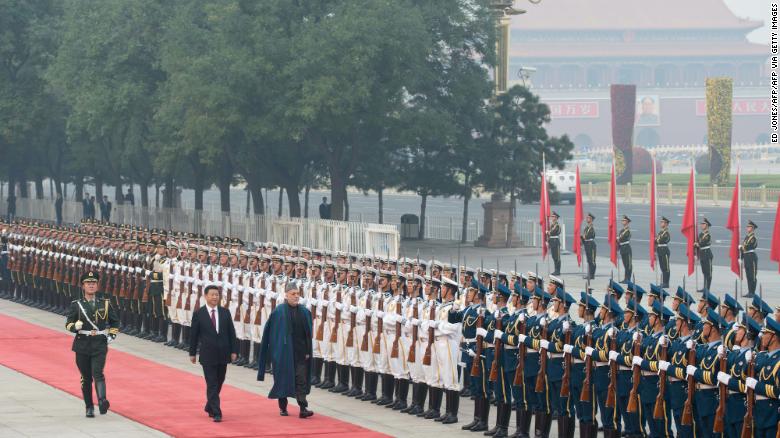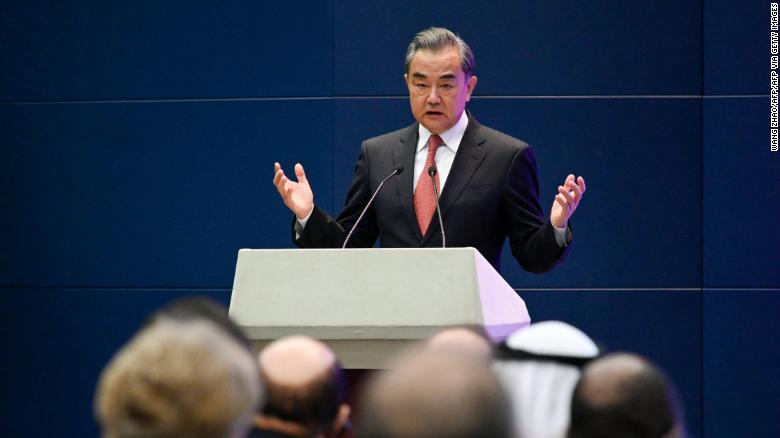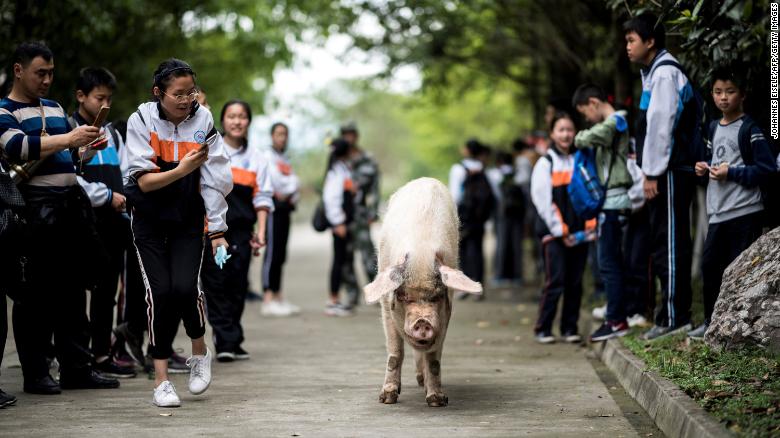by James Griffiths and Nectar Gan
Hong Kong (CNN)China is conflicted about Afghanistan.
Speaking at a forum of Central Asian leaders this week, Chinese Foreign Minister Wang Yi said Beijing supports the withdrawal of foreign troops from Afghanistan and stands ready to play a role in promoting future "stability and development."
Days earlier, however, a spokeswoman for China's foreign ministry had criticized the "recent abrupt US announcement of complete withdrawal of forces," saying this had "led to a succession of explosive attacks throughout the country, worsening the security situation and threatening peace and stability as well as people's life and safety."
These contrasting statements are indicative of how Beijing is torn between seizing the potential opportunity presented by the United States finally pulling out of Afghanistan, and the widespread -- and well founded -- fear that the country could plunge once again into civil war and chaos.
China is normally loathe to support any foreign intervention on principle, but unlike the Iraq War, which Beijing vociferously opposed, China's leaders were quietly supportive of the 2001 invasion of Afghanistan, signing on to a United Nations Security Council resolution condemning the Taliban for harboring al Qaeda and Osama bin Laden, and calling for a new government.
This was in large part due to a recognition that under the Taliban, Afghanistan had become a source of instability on China's border, hosting not only militant groups targeting the West, but also alleged Uyghur extremist organizations seeking an independent Xinjiang, including one that Beijing would blame for numerous terrorist attacks in China during the 1990s and 2000s.

Afghanistan's President Hamid Karzai walks with China's President Xi Jinping as they review an honour guard during a welcoming ceremony at the Great Hall of the People in Beijing on September 27, 2013.
Speaking to state media this week, Song Zhongping, a Chinese military expert, warned that even "if the Afghan government and Taliban reach an agreement to form a new government peacefully ... we should be prepared for any other possibility."
This could mean greater military engagement in the region: China has ramped up its foreign troop presence in recent years, and there have long been unconfirmed reports of People's Liberation Army soldiers operating in Afghanistan. Beijing has also increased its military cooperation with Pakistan and set up a presence in the port of Gwadar, the closest port to landlocked Afghanistan.
Yun Sun, director of the China Program at the Washington-based Stimson Center, wrote this week that Chinese experts are divided "on whether the US withdrawal from Afghanistan presents more challenges or opportunities," pointing out that while the presence of American troops on its border was never welcome, the Afghan quagmire did create a welcome distraction for Washington.
Even by inaction, let alone active interference, the US could easily make Afghanistan a security headache for Beijing, one that distracts China militarily from its major areas of focus in the South China Sea and the border with India.

China's Foreign Minister Wang Yi speaks at a promotional event in Beijing on April 12, 2021.
The business of China: Blistering report alleges Chinese solar panel supply chain tainted by forced labor
As the world tries to combat the climate crisis with solar power, we're now confronted with evidence of a troubling reality: The solar panels purchased to power a greener future could be made with forced labor and dirty coal. A report shared exclusively with CNN Business alleges that solar panel production in China -- which has become a key source of components for the industry -- relies on the exploitation of Xinjiang's Uyghur population and other ethnic and religious minorities.
Solar panel parts companies in China's far western region of Xinjiang create "green energy by consuming cheap, carbon-emitting coal," the report states. They also "sacrifice human labor conditions in the bargain," it adds.
This report will likely draw additional scrutiny to China's outsized role in the global solar power industry, and how much its growth is fueled by cheap energy and labor costs in Xinjiang. The country has between 71% and 97% of the world's capacity for various solar panel components, according to market research firm Bernreuter Research. And the authors of the new report -- which cites hundreds of documents, government statements and satellite imagery -- detail how more than 30 solar product companies may be exposed to forced labor in their supply chains.
The report includes claims that solar product companies are involved in what the Chinese government calls "surplus labor" programs, which facilitate relocation of minority workers in Xinjiang to industrial centers. The researchers claim these workers face detention if they turn down these labor placements.
Beijing denies all claims of human rights abuses in Xinjiang, where the US government alleges that up to two million Uyghurs and other Muslim minority groups have been imprisoned in re-education camps. Western governments and human rights organizations have alleged that minorities in the region have been subjected to physical abuse, attempted indoctrination and forced labor.
The solar industry is just one of many -- from cotton to tomatoes to hair products -- that has come under global scrutiny for links to Xinjiang.
US President Joe Biden's clean energy plan is expected to at least double the rate of spending on solar and wind power, raising the stakes to ensure the industry is free from forced labor. But experts say Xinjiang has become deeply intertwined with the global solar supply chain, meaning that fully cutting it out of the system would be difficult and costly.
-- By Selina Wang
Goodnight, strong-willed prince
A legendary pig that survived 36 days buried in the rubble of China's devastating 2008 Sichuan earthquake is near the end of his life, his caretakers said this week.
Zhu Jianqiang -- or Strong Willed Pig -- became a household name after he survived the 7.9 magnitude quake that killed almost 90,000 people. He lived off charcoal and rainwater, and had lost two thirds of its weight when pulled from a collapsed sty.
Since then, Zhu has lived at a local museum commemorating the disaster and become a symbol of resilience and survival, emblematic of how the region bounced back after the earthquake.
But this week, the museum broke the bad news on social media that the 14-year-old is unwell.

Zhu Jianqing walks with school children during a commemoration ceremony on April 25, 2018.
"Since it arrived at the museum from the debris of the earthquake in 2008, numerous tourists have visited it every day," it said in a post on social media. "What's really behind the public attention is not just a pig, but a collective memory."
"It is a miracle of life; it is a symbol of strong will," the museum said.
Zhu has become so frail he can no longer stand up, according to the state-run Global Times. One of his caretakers told the publication: "In human terms, the pig is now 100 years old."
On Wednesday, Strong Willed Pig marked the 13th anniversary of the quake -- perhaps for the last time. Among the visitors were his former owners, who brought Zhu his favorite snacks.
No comments:
Post a Comment